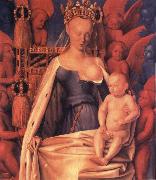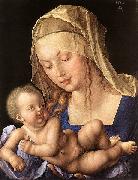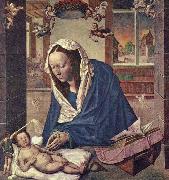Wholesale Oil Painting No Minimum |
|||||||||||
|
|
|||||||||||

|
|||||||||||
|
|
|
||||||||
Jean FouquetFrench 1420-1479 Jean Fouquet Locations French painter and illuminator. He is regarded as the most important French painter of the 15th century and was responsible for introducing Italian Renaissance elements into French painting. Little is known of his life, and, apart from a signed self-portrait medallion (Paris, Louvre), his only authenticated work is the Antiquit?s judaeques (Paris, Bib. N., MS. fr. 247). A corpus of works by Fouquet has therefore been established on the basis of stylistic criteria, but its exact chronology is uncertain. |
||||||||
|
|
||||||||
Maria mit Kind
Maria mit Kind Painting ID:: 34364 |
mk92
ca.1450
91x81cm
Antwerpen,
Koninkluk Museum voor Schone Kunsten
mk92 ca.1450 91x81cm Antwerpen, Koninkluk Museum voor Schone Kunsten |
|||||||
|
|
||||||||
Albrecht Durerb.May 21, 1471, Imperial Free City of Nernberg [Germany] d.April 6, 1528, Nernberg Albrecht Durer (May 21, 1471 ?C April 6, 1528) was a German painter, printmaker and theorist from Nuremberg. His still-famous works include the Apocalypse woodcuts, Knight, Death, and the Devil (1513), Saint Jerome in his Study (1514) and Melencolia I (1514), which has been the subject of extensive analysis and interpretation. His watercolours mark him as one of the first European landscape artists, while his ambitious woodcuts revolutionized the potential of that medium. D??rer introduction of classical motifs into Northern art, through his knowledge of Italian artists and German humanists, have secured his reputation as one of the most important figures of the Northern Renaissance. This is reinforced by his theoretical treatise which involve principles of mathematics, perspective and ideal proportions. His prints established his reputation across Europe when he was still in his twenties, and he has been conventionally regarded as the greatest artist of the Renaissance in Northern Europe ever since. |
||||||||
|
|
||||||||
|
|
Maria mit Kind
Maria mit Kind Painting ID:: 77463 |
Date 1512
Medium Oil on panel
Dimensions 49 ?? 37 cm
cyf Date 1512 Medium Oil on panel Dimensions 49 ?? 37 cm cyf |
||||||
|
|
||||||||
Albrecht Durerb.May 21, 1471, Imperial Free City of Nernberg [Germany] d.April 6, 1528, Nernberg Albrecht Durer (May 21, 1471 ?C April 6, 1528) was a German painter, printmaker and theorist from Nuremberg. His still-famous works include the Apocalypse woodcuts, Knight, Death, and the Devil (1513), Saint Jerome in his Study (1514) and Melencolia I (1514), which has been the subject of extensive analysis and interpretation. His watercolours mark him as one of the first European landscape artists, while his ambitious woodcuts revolutionized the potential of that medium. D??rer introduction of classical motifs into Northern art, through his knowledge of Italian artists and German humanists, have secured his reputation as one of the most important figures of the Northern Renaissance. This is reinforced by his theoretical treatise which involve principles of mathematics, perspective and ideal proportions. His prints established his reputation across Europe when he was still in his twenties, and he has been conventionally regarded as the greatest artist of the Renaissance in Northern Europe ever since. |
||||||||
|
|
||||||||
|
|
Maria mit Kind
Maria mit Kind Painting ID:: 78528 |
1526(1526)
Medium Oil on panel
Dimensions Deutsch: 43 x 32 cm
cyf 1526(1526) Medium Oil on panel Dimensions Deutsch: 43 x 32 cm cyf |
||||||
|
|
||||||||
Albrecht Durerb.May 21, 1471, Imperial Free City of Nernberg [Germany] d.April 6, 1528, Nernberg Albrecht Durer (May 21, 1471 ?C April 6, 1528) was a German painter, printmaker and theorist from Nuremberg. His still-famous works include the Apocalypse woodcuts, Knight, Death, and the Devil (1513), Saint Jerome in his Study (1514) and Melencolia I (1514), which has been the subject of extensive analysis and interpretation. His watercolours mark him as one of the first European landscape artists, while his ambitious woodcuts revolutionized the potential of that medium. D??rer introduction of classical motifs into Northern art, through his knowledge of Italian artists and German humanists, have secured his reputation as one of the most important figures of the Northern Renaissance. This is reinforced by his theoretical treatise which involve principles of mathematics, perspective and ideal proportions. His prints established his reputation across Europe when he was still in his twenties, and he has been conventionally regarded as the greatest artist of the Renaissance in Northern Europe ever since. |
||||||||
|
|
||||||||
|
|
Maria mit Kind
Maria mit Kind Painting ID:: 88634 |
c. 1496
Medium Oil on canvas
Dimensions Deutsch: 95 x 105,5 cm
cjr c. 1496 Medium Oil on canvas Dimensions Deutsch: 95 x 105,5 cm cjr |
||||||
|
|
||||||||
|
Albrecht Durer b.May 21, 1471, Imperial Free City of Nernberg [Germany] d.April 6, 1528, Nernberg Albrecht Durer (May 21, 1471 ?C April 6, 1528) was a German painter, printmaker and theorist from Nuremberg. His still-famous works include the Apocalypse woodcuts, Knight, Death, and the Devil (1513), Saint Jerome in his Study (1514) and Melencolia I (1514), which has been the subject of extensive analysis and interpretation. His watercolours mark him as one of the first European landscape artists, while his ambitious woodcuts revolutionized the potential of that medium. D??rer introduction of classical motifs into Northern art, through his knowledge of Italian artists and German humanists, have secured his reputation as one of the most important figures of the Northern Renaissance. This is reinforced by his theoretical treatise which involve principles of mathematics, perspective and ideal proportions. His prints established his reputation across Europe when he was still in his twenties, and he has been conventionally regarded as the greatest artist of the Renaissance in Northern Europe ever since. Maria mit Kind c. 1496 Medium Oil on canvas Dimensions Deutsch: 95 x 105,5 cm cjr |
||||||||
|
|
||||||||
|
Prev Next
|
||||||||
|
|
||||||||
|
Related Paintings to Albrecht Durer :. |
||||||||
|
|
||||||||
|
CONTACT US |




